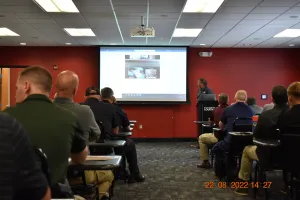LOUISVILLE, Ky—U.S. Customs and Border Protection (CBP) officers in Louisville teamed up with other federal and local law enforcement agencies to focus on the opioid epidemic and how agencies can protect communities from this lethal narcotic.
The Non-Intrusive Inspection Division and the Port of Louisville hosted a Drug IQ seminar at a local university. There were 13 separate law enforcement organizations participating to include: CBP, Coast Guard, FBI, Indiana State Police, Kentucky State Police, Ft. Knox Police Department, Louisville Airport Police Department, and several sheriff departments.
The goal of Drug IQ is to prepare responders and investigators to implement risk-based response tactics to safely respond to incidents involving synthetic opioids, including clandestine labs. The course was 50% hands-on, with students gaining firsthand experience operating several types of synthetic opioid clandestine labs to include pilling and milling and performing detection and identification of synthetic opioids using actual fentanyl analogs.
Students also learned to conduct a synthetic opioid risk assessment using incident indicators and by using multiple detection technologies including FT-IR, Raman, Colorimetric test kits, and High-Pressure Mass Spec. Based on the level of risk assessment, students learned to implement four levels of risk-based response guidelines that provide responders and investigators with specific guidance on resources required, personal protective equipment selection, safety considerations, tactical considerations, and decontamination for responders, victims, and suspects.
“This training is very valuable for our officers as well as the other agencies,” said LaFonda D. Sutton Burke, Directory, Field Operation-Chicago Field Office. “These officers see opioids on a daily basis and going through this training gives them experience and knowledge on how to deal with these situations.”
Additionally, officers were educated on the constantly evolving world of drugs and the current trends being seen throughout the country and the region. Attendees were told how the dark web is being used to buy, sell, and traffic these emerging drugs, and the detection devices used to identify these drugs.
“Being able to train with other law enforcement officers is invaluable,” said Thomas Mahn, Port Director-Louisville. “The opportunity to share stories and learn from others is training you can’t find in a book, and it was beneficial to all of us.”
Training finished with hands-on demonstrations and case studies. Officers learned about the common techniques of cybercrime and how local law enforcement can appropriately respond. Participants also gained an understanding of cryptocurrencies and how to investigate them.


